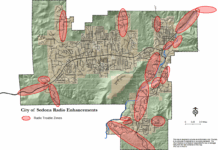After a year-long investigation, the Arizona Attorney General’s Office cleared the city of Sedona of any wrongdoing regarding funding to the Sedona Chamber of Commerce.
In its findings, which were released on Tuesday, Aug. 20, the AG concluded that the agreement between the city and the chamber is not itself illegal or necessarily causes illegal payments of public monies under state law.
“Although the pattern of overpayments resulting from greater-than-anticipated bed tax revenues created significant potential for a state Gift Clause violation, the city appears to have mitigated that potential by reworking the agreement to eliminate the automatic remittance of 55% of bed tax revenues to the chamber. And because the city also took steps to effectively claw back funds that were overpaid, no basis currently exists for further action by the Attorney General on this matter.”
The investigation stems from a July 17, 2018, request by Arizona State Sen. Judy Burgess [R-District 22] to the AG for legal review of the agreement between the city and chamber.
Even though Burgess’ request was subsequently withdrawn, the AG opened an inquiry into whether the city-chamber agreement violated state law.
“The final report from the Attorney General’s Office confirmed what the city has always believed, which is that the agreement with the chamber is both well-designed and legally sound,” City Attorney Robert Pickels said. “The change to move away from the 55% and build an appropriate work plan and budget each year only strengthens the process and the city’s long-term relationship with the chamber.”
Between 2014 and 2019 the city paid the chamber 55% of collected annual transient bed tax. According to the findings, “The investigation reviewed whether the agreement gave rise to a claim under state law, which authorizes the AG to bring a claim to enjoin or recover the illegal payment of public money.”
The AG reviewed information and documentation provided by the city and spoke with city officials regarding the agreement.
“The Attorney General concludes that although the payment structure established by the agreement twice caused the city to pay more to the chamber than was due to be paid under the chamber’s city-approved budget, an illegal payment of public money did not occur because the city ultimately accounted for the overpayment through additional appropriations,” the findings state.
“In addition, on July 10, 2019, the city approved changes to the agreement that eliminated the requirement to provide 55% of bed tax revenues to the chamber. It established that, beginning with Fiscal Year 2020, the chamber would receive only what the city approves via the annual budgeting process that the city and chamber undertake.”
The AG findings state that in each fiscal year since the ordinance’s adoption, the city has paid the chamber at least the total estimated amount of bed tax revenue at or below the chamber’s submitted annual budget. However, in the situations where the city generated more-than-projected revenue, and thereby had a larger than expected “true-up” payment, overpayments were made to the chamber above the approved line item budget.
In both instances, the city took steps to manage the excess funds. In FY16, the excess funds of $180,009 were restricted for use and only released for the chamber to purchase the Jordan Road property in FY18 on the city’s behalf. In FY18, the city exercised its contractual “hold-back” from the FY19 budget to reserve $268,900 of the estimated bed tax collection, thereby accounting for the $116,150 overpayment made for FY18.
Ron Eland can be reached at 282-7795, ext. 122 or by email at reland@larsonnewspapers.com



















